Review for Red Letter Day: The Complete Series
'Red Letter Day' is a strong collection of seven one hour dramas from Granada which originally aired in the UK in early 1976 (production titles all read 1975). The lion's share of these were penned by Jack Rosenthal who is also credited with conceiving this particular series of 'plays' glued together with the 'red letter day' theme.
Rosenthal was a northern playwright who had come into TV penning some 129 episodes of Coronation Street, as well as over 150 screenplays. One of the highlights of his career was undoubtedly the magnificent 'Ready when you are Mr. McGill' which was re-made in 2003. The original version is included here. As the first episode of the set it sets the bar absurdly high. So high in fact that nothing that follows comes close to its brilliance, though there are some other corkers here too.
So here's what you get - and for the price, it's a handsome collection.
Ready When You Are, Mr. McGill
Written by Jack Rosenthal
Directed by Mike Newell
Original ITV Transmission 11 January 1976
Starring Joe Black, Jack Shepherd, Barbara Moore-Black, Stanley Lebor and Fred Feast
What a magical play for anyone who has ever been involved in the TV or film industry! Those of us who have endured the pencil-snapping frustrations of a complex take being spoiled by badly delivered or forgotten lines, a passing plane, uncontrollable extraneous noise, or union run crews downing tools as soon as the catering van arrives will enjoy this hilarious, and poignant, expose of film-making.
It starts off from the bedroom of Joe McGill who, after years of being just another extra in crowd scenes, has finally got his big break with a couple of lines of dialogue. Just two simple lines - but critical for the drama.
The location is a charming but remote northern village, with extras arriving in a bus, the blasé professional actors by taxi, and the crew already in position, huddled against the elements and the threat of rain. Of course, the Director has a tough job to do and hasn't the time or the inclination to discuss McGill's lines at length or feedback on his performance. In fact, his behaviour, as the pressure rises, is pretty abominable and it would seem he's on the edge of a breakdown. There is eventually a poignant resolution as McGill gives him a very grounded dressing down after the Director hurls a tirade of abuse at McGill who cannot get the emphasis of his lines right.
The whole thing is a delight from start to finish with the crew cruelly well observed. (Check out the soundman who hears distant sounds of approaching aircraft a full minute before anyone else or the cameraman who eventually refuses to shoot in the torrential rain).
In common with any shoots that I've been on that go awry, everyone ends up agreeing that they'll fix it in post-production. Truer today than ever! Brilliant stuff.
The Five-Pound Orange
Written by Donald Churchill
Directed by June Howson
Original ITV Transmission 18 January 1976
Starring Peter Barkworth, Sarah Badel, Bernard Horsfall and Natasha Parry
This is a classic exploration of the follies of middle-aged men who trade in good relationships with their wives for the worship of pretty legs. Peter Barkworth is exceptionally well-cast as a University lecturer just north of 40, trapped in a new relationship with a woman who's values he detests - but whose physical beauty he cannot resist. We see him struggle with conscience and ethics until his new partner pushes him too far, making him take a long hard look at his life. Excellent stuff. (Oh - the five pound orange actually refers to a rare stamp. Watch it and all will become clear!)
Well Thankyou, Thursday
Written by Jack Rosenthal
Directed by Brian Mills
Original ITV Transmission 25 January 1976
Starring Judy Parfitt, Andrew Ray, Philip Jackson and Brenda Cavendish
Six people's Red Letter Days coincide at the register office: Toby and Glenda cannot decide on a name for their baby; Mr. Crabtree has to register the death of his wife; and Stan and Liz have a faltering wedding with forgotton lines and an unwelcome harmonica player. In the meantime, Miss Shepherd, Supt. of Marriages and Deputy Registrar of Births and Deaths, is really only interested in one thing - the arrival of her new desk. With a new desk her life would be back on track and everything would be fine. Or will it?
The inter-twining stories are variable and occasionally slip into farce though the play bumbles along at an enjoyable enough pace.
Amazing Stories
Starring Rula Lenska, Joe Melia, John Normington, Harold Kasket and Ian McDiarmid
Written by Howard Schuman
Directed by Peter Plummer
Original ITV Transmission 1 February 1976
If you've ever read one of Philip K. Dick's weirder books (such as Ubik) then you'll know what to expect. On the surface of this episode, there seems to be some sort of depressing reality though as the play progresses it becomes increasingly difficult to separate fact from fantasy.
Stanley is a man in his fifties who's family have sunk into depression. Stanley on the other hand is always happy, retreating as he does into the world of Science Fiction. He attends a sci-fair fan fair with a friend (before Star Wars this, but apart from that pretty much like a sci-fi fair I attended recently) and meets the author of his favourite stories - all published in 'Amazing Stories' in the fifties.
At times surreal, often confounding, there are moments of pure Beckett to this play which becomes increasingly preposterous until imploding on itself in an ending that is as inconclusive as it was sudden. I can't imagine how the viewing figures faired for the series after this!
Match Fit
Written by Willis Hall
Based on a story by Brian Glanville
Directed by Gordon Flemyng
Original ITV Transmission 8 February 1976
Starring Clare Kelly, Anne Reid, Steven Pacey and Roddy McMillan
Pretty much a two-hander, this reflects the relationship between a man and a boy who are both recovering in a TB clinic and who have a love in common - footy! Brian is a Londoner but he still recognises the very dour Scottish football manager Billy Marshall. Through a series of monologues, Brian soon finds himself the one to be offering advice. It proves to be just the tonic.
For Services to Myself
Written by C.P. Taylor
Directed by Gordon Flemyng
Original ITV Transmission 15 February 1976
Starring James Hazeldine, Adrienne Frank, Alan Dobie, Ronald Radd and Gwen Cherrell
You'd think being awarded an OBE by the Queen would be a good thing. For Roger Banks' wife and family it really is, though he is not so sure. As a long-time socialist he has real reservations about hobnobbing with the monarchy and so an hour-long episode of soul searching begins. It's a well-played piece though all highly predictable.
Bag of Yeast
Starring Alison Steadman, Bill Dean, Neville Smith and Peter Kerrigan
Written by Neville Smith
Directed by Michael Grigsby
Original ITV Transmission 22 February 1976
Any play featuring Alison Steadman in from this era has got to be good, right? Well, sort of. A twenty something schoolteacher, Tony Scannell, is engaged to be married. Which would be fine. But he has also decided to be ordained as a priest in the Roman Catholic church (Hence the title…'Bag of Yeast' is cockney rhyming slang for priest). That's not good news for his family who don't understand his decision. Cue Ms. Steadman!
Picture quality is wildly variable throughout with some of the location material looking decidedly washed out and a little grainy. This is unlikely to be a fault of transfer but rather the favoured look of the day. Shot on 16mm, grainy low contrast grading was very popular for this type of kitchen-sink realism; a style that to some degree mimicked the look of video at the time. It's not a look I like though it is prevalent in the latter half of the 1970's and early 1980's.
All in all though another great value set from Network, arguably worth it for 'Ready when you are, Mr. McGill' alone.
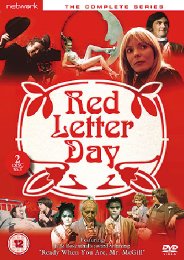
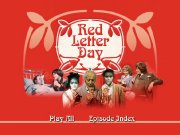
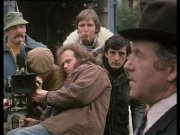
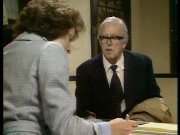
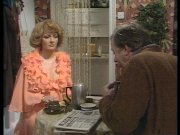
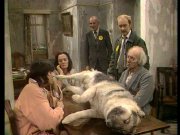
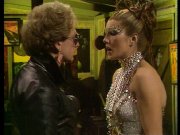
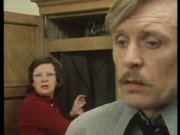
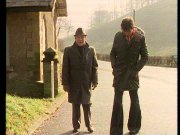










































Your Opinions and Comments
Be the first to post a comment!